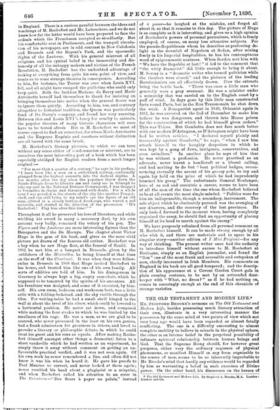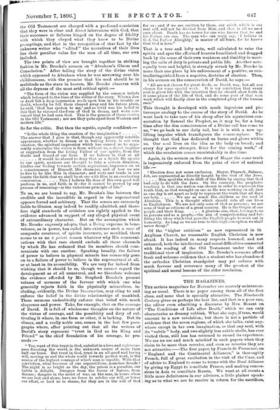THE OLD TESTAMENT AND MODERN LIFE.* MR. STOPFORD BROOKE'S sermons
on The Old Testament and Modern Life, besides possessing much literary attraction of their own, illustrate in a very interesting manner the possession by the same mind of two points of view which not very long ago would have been regarded as almost fatally conflicting. The one is a difficulty amounting to almost complete inability to believe in miracle in the physical sphere, the other is an intense belief in the perpetual possibility of intimate spiritual relationship between human beings and God. That the Supreme Being should, for however great purposes, either vary the ordinary sequence of physical phenomena, or manifest Himself in any form cognisable to the senses of men, seems to be so inherently improbable to Mr Brooke's mind that hardly any evidence would be regarded by him as warranting a belief in such exercises of Divine power. On the other hand, his discourses on the heroes of • The Old Teitament and Modern Life. By Stopford A. Brooke, M.A. London : L:biater and Co.
the Old Testament are charged with a profound conviction that they were in close and direct intercourse with God, that their successes or failures hinged on the degree of fidelity with which they obeyed what they knew to be Divine promptings, and that in the recognition of that fact by the unknown writer who "edited" the narratives of their lives lies their peculiar value for the men of all time, our own included.
The two points of view are brought together in striking fashion in Mr. Brooke's sermon on "Abraham's Gloom and Consolation." After telling the story of the divine vision which appeared to Abraham when he was sorrowing over his childlessness, with the promise that his seed should be in multitude as the stars in heaven, Mr. Brooke observes with all the dryness of the most arid critical spirit :—
" The form of the vision was supplied by the common beliefs which belonged to the time of the writer of the story. When a Jew or Arab felt a deep impression made upon him in his trouble or doubt, whereby he felt them cleared away and his future plain, he said, 'God has spoken to me,' and so vivid was his belief in this that he visioned the form of God in dream, and woke con- vinced that he had seen God. This is the genesis of these stories in the Old Testament; nor are they quite apart from Western and modern life."
So far the critic. But then the mystic, equally confident :—
" Is the whole thing the creation of the imagination ? •
The answer that I give is that, though any apparently sensible appearance, whether in dream or in waking hours, is our own creation, the spiritual impression which has caused us to appa- rently materialise the vision is from without us, a direct impulse or suggestion from the loving Father of our spirits, from the Guide and Guard of our lives. If we believe in God at all it would be absurd to deny that as a Spirit He speaks to our spirit, awakens our thought to take a certain direction, kindles our feeling towards certain aspirations, impresses on us a consciousness of Himself, His character, and of bow we are to live to be like Him in character; and roots and tends in our hearts the faith that we shall be at one with Him in an everlasting communion This I believe He does of His own good will perform in us, and faith in it—for it cannot be proved by any process of reasoning—is the victorious principle of life."
To us, we are bound to say, Mr. Brooke's line between the credible and the incredible in regard to the supernatural appears forced and arbitrary. That the senses are extremely liable to illusion may indeed be readily admitted, and there- fore rigid standards of criticism are rightly applied to the evidence advanced in support of any alleged physical event of extraordinary character. But on the assumption which Mr. Brooke expressly adopts, that a Being supreme in bene- volence, as in power, has called into existence such a race of composite creatures, of spirits incarnate, as mankind, there seems to us no a priori reason whatever why His communi- cations with that race should exclude all those channels by which He has ordained that its members should com- municate with one another. Speaking broadly, the failure of power to believe in physical miracle has commonly gone on to a failure of power to believe in the supernatural at all, or at least in its accessibility. We are very far indeed from wishing that it should be so, though we cannot regard the
development as at all unnatural, and we therefore welcome
the evidence afforded by Mr. Stopford Brooke's present volume of sermons of the fervour with which one who generally rejects faith in the physically miraculous, in- cluding, evidently, the Divine Incarnation, may cling to and enforce the belief in the divine relationships of mankind. These sermons undoubtedly enforce that belief with much eloquence and power. Take, for example, that on the courage of David. It is full of wholesome thoughts on the nature of the virtue of courage, and the possibility and duty of cul- tivating it where, in one form or other, it is lacking. But its climax, and a really noble one, comes in the last few para- graphs where, after pointing out that all the writers of David's story represent "trust in God as his King and Friend" as the chief foundation of his courage, he pro- ceeds :— " Yes, want of this trust in God, unbelief in a love and righteous- ness directing the world, is the unknown source of more than half our fears. But trust in God, trust in an all-good and loving will, moving us and the whole world towards perfect work, is the source of the highest courage of which man is capable. With that conviction, what becomes of our superstitious, nameless dreads ? The night is as bright as the day, the prison is a paradise, our battle is delight. Dangers from the forces of Nature, from disease; dangers in the midst of war, on the seas, in hours when we are lost and alone, have no force to subdue our will, or lower our effort, or lead us to shame, for they are in the will of God for us ; and if we are smitten by them, our spirit, which is our real self, will not be divided from Him, and that is all we need care about. Death has no terror for one who knows that he and his Father are one. The man who can truly say, • I believe in GA, the Father Almighty,' is master of all fears, for he knows that God is love."
That is a true and lofty note, well calculated to raise the spirits and spur the efforts of hearers humiliated and dragged back by the sense of their own weakness and timidity in meet- ing the calls of duty in private and public life. Another note., equally true and helpful, is strongly struck by Mr. Brooke in more than one place by his enforcement of a positive, as con- tradistinguished from a negative, doctrine of election. Thus, in his sermon on the consecration of David, he says :— "All are not chosen for great deeds, as David was, but all are chosen for some special work. It is my conviction that every soul is given life with the intention that he should show forth in it some phase of the life of God, and do some part of that vast work which will finally close in the completed glory of the human race."
This thought is developed with much ingenious and pic- turesque analogy to the course of the story of David. As he went back to take care of his sheep after his mysterious con-
secration by Samuel the Prophet, so, it may be, for a long time after the dim consciousness of a Divine call has come to us, "we go back to our daily toil, but it is with a new up- lifting impulse which transfigures the commonplace. The
thought that God has dedicated us burns and glows within us. Our soul lives on the idea as the body on bread ; and every day grows stronger, fitter for the coming work," of which the revelation comes unmistakably in due time.
Again, in the sermon on the story of Hagar the same truth is impressively enforced from the point of view of national life :—
"Election does not mean exclusion. Hagar, Pharaoh, Balsam, Job, are represented as directly taught by the God of the Jews.
Men spoilthe whole drift of the Bible by saying that God had only to do with the Jews. On the contrary, the prophetic teaching is that one nation was chosen in order to represent the truth that, as God wrought on one so He was working on all, just as one day is set apart as holy to represent the truth that all days are holy We are as much His children as the seed of Abraham. This is a thought which should rule all our lives as Englishmen. We are not only sons of God as persons ; we are sons of God as citizens of a great country. He is the Origin of our people and their King, • . . . A glorious aim, then, belongs to us as persons and as a people,—the aim of comprehending and ful- filling the ideas which God gave the English people to work out in humanity. As long as we are true to this high conception we shall never decay."
Of the "higher criticism" as now represented in th Anglican Church, no reasonable English Christian is now afraid. It has indeed m many respects lessened, and not enhanced, both the intellectual and moral difficulties connected with the reading of the Old Testament under the old traditional view of inspiration. Mr. Brooke's sermons afford fresh and welcome evidence that a student who has abandoned the orthodox Christian standpoint may yet enforce with much fervour and reverence many of the greatest of the spiritual and moral lessons of the older revelation.



















































 Previous page
Previous page